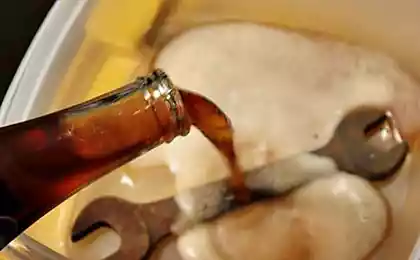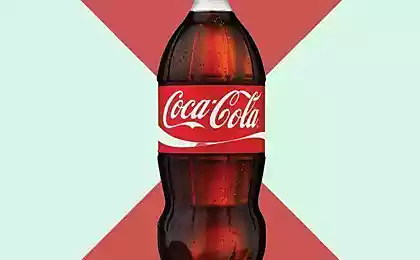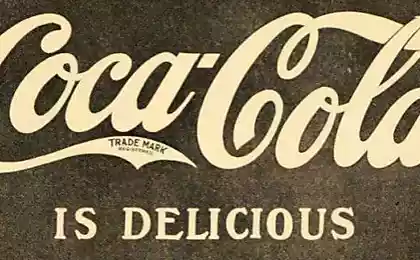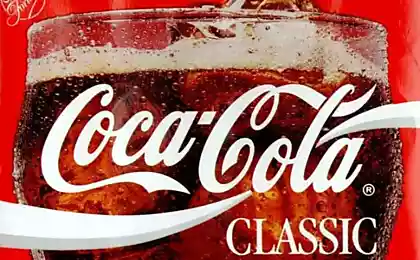525
9 side effects of soda and Cola
You may have heard from various sources about the dangers of sugary sodas that it is devoid of any nutritional value and leads to obesity and diabetes. But we got 9 other alarming evidence that sugar water does to your body, including side effects of Sucralose and other artificial sweeteners or ingredients that can even cause memory loss.
Weird Fat in weird places
Recently, Danish researchers found that drinking sugar water causes a sharp increase in the accumulation of fat around your liver and your skeletal muscles that may contribute to insulin resistance and diabetes.
The study showed that people who drank regular soda every day for six months found an increase of fat in the liver on 132-142% increase in skeletal fat 117-221% and about 30% increase in triglycerides in the blood and other organs. Consumption of sweet water have also led to 11% increase in cholesterol, compared with people who drank other beverages such as water or milk.
Diet sugar water leads to obesity It is not surprising that the sugar in soda leads to weight gain, but what is surprising is that even diet soda gaining weight: researchers from the University health Texas monitored 475 adults for 10 years and found that those who drank diet soda had an increase of 70% in waist circumference, compared to those who did not drink soda. Those who drank more than two diet fizzy drinks a day got a 500% waist expansion! A separate study the same researchers conducted on mice suggested that it was the aspartame, which raised the level of glucose in the blood, leading to weight gain; when your liver gets too much glucose, the excess turns into fat.
Caramel — cause of cancer In 2011, the nonprofit Center for science in the public interest appealed to the management of the food and drug administration to ban artificial caramel coloring used to produce Coke, Pepsi, and other colas brown.
The reason: Two contaminants were found in the coloring, 2-methylimidazole and 4-methylimidazole. They cause cancer in animals, the threat is not necessary, considering that the coloring is purely cosmetic. According to the list of 65 chemicals that cause cancer, just 16 micrograms per person per day of 4-methylimidazole is enough to pose a cancer threat, and most popular brown colas, which regularly use consumers, contain 200 micrograms per bottle.
Premature aging
Diet or regular, all colas contain phosphates, or phosphoric acid, a weak acid that gives colas their tangy flavor and improves their shelf life. Although it exists in many whole foods, such as meat, dairy products and nuts, too much phosphoric acid can lead to problems with heart and kidney, muscle loss and osteoporosis, and one study suggests it could trigger accelerated aging. In a study published in 2010 in the FASEB Journal, found that the excessive phosphate levels found in carbonated drinks caused deaths in lab rats by as much as five weeks earlier than usual. This is a disturbing trend considering that soda manufacturers and colas increase the level of phosphoric acid in their products over the past few decades.
Water pollution
Artificial sweeteners used in diet soda will not dissolve in our bodies, they will not be caught by wastewater treatment plants before they get into water sources. In 2009, Swiss scientists tested water samples from wastewater-treatment plants, rivers and lakes in Switzerland and recorded the levels of Acesulfame K, Sucralose, and saccharin, each of which are or have been used in diet carbonated drinks. A recent test of 19 centers munitsipalnih water supplies in the U.S. revealed the presence of Sucralose in every one. It is not clear what they do for people, but studies have shown that Sucralose in rivers and lakes interferes with the eating habits of some organisms.
Mountain Dew wins the Mind
Incredibly popular among children and teenagers drink Mountain Dew, glowing in the bottle could be the next disease, which was named in honor of the material. An ingredient called brominated vegetable oil, or BRM, which is added to prevent separation of the flavor from the drink, is an industrial chemical. It is used as a flame retardant in plastics. In addition, other non-alcoholic drinks, sports drinks based on citrus, this chemical causes memory loss and nerve disorders when consumed in large quantities. The researchers also suspect that, like brominated flame retardants used in furniture foam, if the chemical accumulates in fatty tissues for extended periods of time, it can lead to behavioral problems, infertility and damage to the heart muscle.
Dangerous banks Not only soda is causing all the problems. Nearly all aluminum soda cans contain a epoxy resin called bisphenol a (BPA), used to store the acids in the soda. BPA is known to interfere with the function of hormones and has been associated with everything from infertility to obesity and diabetes, and some forms of reproductive cancers. The centers for control and prevention of diseases referred to as soda cans, along with fast fudami the main sources of exposure to chemicals.
And while Pepsi and Coca-Cola are fighting for supremacy in the development of a plastic bottle is 100% plant-based, which they are touting as "BPA free," no company is ready to switch to BPA-free aluminum cans.
Dead Birds Before you switch from cans to bottles, you should look at the photos of environmentalist and photographer Chris Jordan, who visited the area midway in 2009. That's near the Large garbage patches in the Pacific ocean". Here the fish swims interspersed with a mass of plastic debris just beneath the surface of the water. Birds, sea turtles and other animals, chasing fish, eating large quantities of plastic, which they are not able to digest. Ultimately, the plastic causes them to starve and die. It is believed that thousands of animals die this way each year.
Unknown Side effects of GMOs
Take a look at the ingredients list for any soda or coke, most of these ingredients are derived from corn. 88% of corn now is genetically modified and resistant to pesticides, or engineering created pesticides inside the plant itself. Preferential rules of government security and tight corporate control over who gets to test these proprietary seeds, there are no studies which can prove or disprove whether these crops are safe for humans. Independent scientists found that animals fed genetically modified crops were recorded by way of digestive tract damage, accelerated aging and even infertility. Recently, scientists in France found that rats who were fed GMO corn for their entire two-year life were breast tumors, and premature death than the rats who ate GMO corn for their entire life.
Source: rodovid.me
Weird Fat in weird places
Recently, Danish researchers found that drinking sugar water causes a sharp increase in the accumulation of fat around your liver and your skeletal muscles that may contribute to insulin resistance and diabetes.
The study showed that people who drank regular soda every day for six months found an increase of fat in the liver on 132-142% increase in skeletal fat 117-221% and about 30% increase in triglycerides in the blood and other organs. Consumption of sweet water have also led to 11% increase in cholesterol, compared with people who drank other beverages such as water or milk.
Diet sugar water leads to obesity It is not surprising that the sugar in soda leads to weight gain, but what is surprising is that even diet soda gaining weight: researchers from the University health Texas monitored 475 adults for 10 years and found that those who drank diet soda had an increase of 70% in waist circumference, compared to those who did not drink soda. Those who drank more than two diet fizzy drinks a day got a 500% waist expansion! A separate study the same researchers conducted on mice suggested that it was the aspartame, which raised the level of glucose in the blood, leading to weight gain; when your liver gets too much glucose, the excess turns into fat.
Caramel — cause of cancer In 2011, the nonprofit Center for science in the public interest appealed to the management of the food and drug administration to ban artificial caramel coloring used to produce Coke, Pepsi, and other colas brown.
The reason: Two contaminants were found in the coloring, 2-methylimidazole and 4-methylimidazole. They cause cancer in animals, the threat is not necessary, considering that the coloring is purely cosmetic. According to the list of 65 chemicals that cause cancer, just 16 micrograms per person per day of 4-methylimidazole is enough to pose a cancer threat, and most popular brown colas, which regularly use consumers, contain 200 micrograms per bottle.
Premature aging
Diet or regular, all colas contain phosphates, or phosphoric acid, a weak acid that gives colas their tangy flavor and improves their shelf life. Although it exists in many whole foods, such as meat, dairy products and nuts, too much phosphoric acid can lead to problems with heart and kidney, muscle loss and osteoporosis, and one study suggests it could trigger accelerated aging. In a study published in 2010 in the FASEB Journal, found that the excessive phosphate levels found in carbonated drinks caused deaths in lab rats by as much as five weeks earlier than usual. This is a disturbing trend considering that soda manufacturers and colas increase the level of phosphoric acid in their products over the past few decades.
Water pollution
Artificial sweeteners used in diet soda will not dissolve in our bodies, they will not be caught by wastewater treatment plants before they get into water sources. In 2009, Swiss scientists tested water samples from wastewater-treatment plants, rivers and lakes in Switzerland and recorded the levels of Acesulfame K, Sucralose, and saccharin, each of which are or have been used in diet carbonated drinks. A recent test of 19 centers munitsipalnih water supplies in the U.S. revealed the presence of Sucralose in every one. It is not clear what they do for people, but studies have shown that Sucralose in rivers and lakes interferes with the eating habits of some organisms.
Mountain Dew wins the Mind
Incredibly popular among children and teenagers drink Mountain Dew, glowing in the bottle could be the next disease, which was named in honor of the material. An ingredient called brominated vegetable oil, or BRM, which is added to prevent separation of the flavor from the drink, is an industrial chemical. It is used as a flame retardant in plastics. In addition, other non-alcoholic drinks, sports drinks based on citrus, this chemical causes memory loss and nerve disorders when consumed in large quantities. The researchers also suspect that, like brominated flame retardants used in furniture foam, if the chemical accumulates in fatty tissues for extended periods of time, it can lead to behavioral problems, infertility and damage to the heart muscle.
Dangerous banks Not only soda is causing all the problems. Nearly all aluminum soda cans contain a epoxy resin called bisphenol a (BPA), used to store the acids in the soda. BPA is known to interfere with the function of hormones and has been associated with everything from infertility to obesity and diabetes, and some forms of reproductive cancers. The centers for control and prevention of diseases referred to as soda cans, along with fast fudami the main sources of exposure to chemicals.
And while Pepsi and Coca-Cola are fighting for supremacy in the development of a plastic bottle is 100% plant-based, which they are touting as "BPA free," no company is ready to switch to BPA-free aluminum cans.
Dead Birds Before you switch from cans to bottles, you should look at the photos of environmentalist and photographer Chris Jordan, who visited the area midway in 2009. That's near the Large garbage patches in the Pacific ocean". Here the fish swims interspersed with a mass of plastic debris just beneath the surface of the water. Birds, sea turtles and other animals, chasing fish, eating large quantities of plastic, which they are not able to digest. Ultimately, the plastic causes them to starve and die. It is believed that thousands of animals die this way each year.
Unknown Side effects of GMOs
Take a look at the ingredients list for any soda or coke, most of these ingredients are derived from corn. 88% of corn now is genetically modified and resistant to pesticides, or engineering created pesticides inside the plant itself. Preferential rules of government security and tight corporate control over who gets to test these proprietary seeds, there are no studies which can prove or disprove whether these crops are safe for humans. Independent scientists found that animals fed genetically modified crops were recorded by way of digestive tract damage, accelerated aging and even infertility. Recently, scientists in France found that rats who were fed GMO corn for their entire two-year life were breast tumors, and premature death than the rats who ate GMO corn for their entire life.
Source: rodovid.me
Vitamin supplements increase the risk of cancer
Doctors revealed the secret of how much to eat and not gain weight























